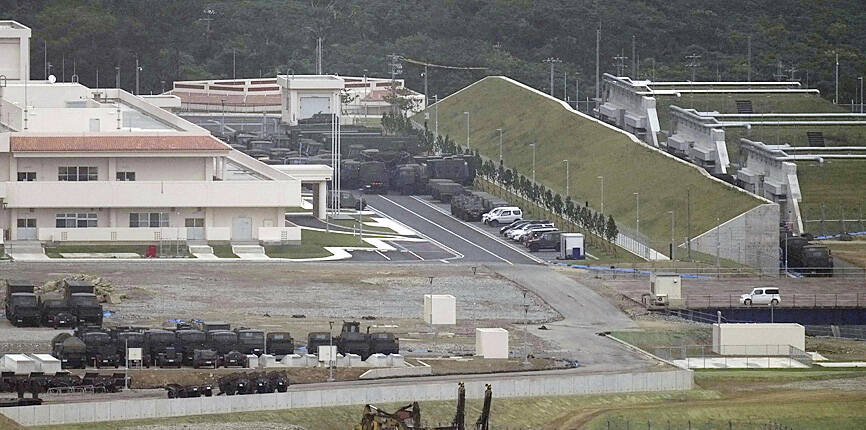The Japan Ground Self-Defense Force recently deployed a newly created ground-to-surface missile company that is to be based in Uruma City, Okinawa Prefecture, while expanding an electronic warfare unit on Yonaguni Island, Japan’s closest island to Taiwan.
A report by Kyodo News on Thursday said that the deployment was to bolster Japan’s defenses in its southwestern region in case sudden incidents occur around Taiwan.
The report said that the new company was named the 7 ground-to-surface missile company and is tasked with defending Miyakojima City, Ishigaki City and Amami Oshima Island.

Photo: AP
However, the report said that the Ground Self-Defense Force’s decision has raised discontent amongst the local populace, with 70 residents gathering in front of the force’s Camp Katsuren in protest on Thursday.
Opposition representatives said that if Okinawa residents accepted the company’s deployment without opposition, “there is no telling how the company will be reinforced,” adding that Okinawa should not become a weapon of war, the report said.
The report said that an electronic warfare unit, about 40 people strong, was deployed from Kumamoto Prefecture to Yonaguni to jam or interfere with hostile forces’ signals and radar stations.
Meanwhile, Yonaguni Island has been the home base of a 160-person electronic warfare unit since 2016, primarily tasked with monitoring the movements of nearby ships, the report added.
The Yonaguni garrison is expected to expand its base eastward, with a shooting range and munitions warehouse built in the new areas and facilities to house a planned deployment of a surface-to-air missile company, it said.
Ground Self-Defense Force Chief of Staff Yasunori Morishita told Kyodo News that the newly created unit would strengthen the force’s ability to react and deter a potential invasion by hostile forces.
Morishita said the force would explain to residents why the units’ deployment is necessary to safeguard Japan’s southwestern region.

Right-wing political scientist Laura Fernandez on Sunday won Costa Rica’s presidential election by a landslide, after promising to crack down on rising violence linked to the cocaine trade. Fernandez’s nearest rival, economist Alvaro Ramos, conceded defeat as results showed the ruling party far exceeding the threshold of 40 percent needed to avoid a runoff. With 94 percent of polling stations counted, the political heir of outgoing Costa Rican President Rodrigo Chaves had captured 48.3 percent of the vote compared with Ramos’ 33.4 percent, the Supreme Electoral Tribunal said. As soon as the first results were announced, members of Fernandez’s Sovereign People’s Party

MORE RESPONSIBILITY: Draftees would be expected to fight alongside professional soldiers, likely requiring the transformation of some training brigades into combat units The armed forces are to start incorporating new conscripts into combined arms brigades this year to enhance combat readiness, the Executive Yuan’s latest policy report said. The new policy would affect Taiwanese men entering the military for their compulsory service, which was extended to one year under reforms by then-president Tsai Ing-wen (蔡英文) in 2022. The conscripts would be trained to operate machine guns, uncrewed aerial vehicles, anti-tank guided missile launchers and Stinger air defense systems, the report said, adding that the basic training would be lengthened to eight weeks. After basic training, conscripts would be sorted into infantry battalions that would take

GROWING AMBITIONS: The scale and tempo of the operations show that the Strait has become the core theater for China to expand its security interests, the report said Chinese military aircraft incursions around Taiwan have surged nearly 15-fold over the past five years, according to a report released yesterday by the Democratic Progressive Party’s (DPP) Department of China Affairs. Sorties in the Taiwan Strait were previously irregular, totaling 380 in 2020, but have since evolved into routine operations, the report showed. “This demonstrates that the Taiwan Strait has become both the starting point and testing ground for Beijing’s expansionist ambitions,” it said. Driven by military expansionism, China is systematically pursuing actions aimed at altering the regional “status quo,” the department said, adding that Taiwan represents the most critical link in China’s

EMERGING FIELDS: The Chinese president said that the two countries would explore cooperation in green technology, the digital economy and artificial intelligence Chinese President Xi Jinping (習近平) yesterday called for an “equal and orderly multipolar world” in the face of “unilateral bullying,” in an apparent jab at the US. Xi was speaking during talks in Beijing with Uruguayan President Yamandu Orsi, the first South American leader to visit China since US special forces captured then-Venezuelan president Nicolas Maduro last month — an operation that Beijing condemned as a violation of sovereignty. Orsi follows a slew of leaders to have visited China seeking to boost ties with the world’s second-largest economy to hedge against US President Donald Trump’s increasingly unpredictable administration. “The international situation is fraught